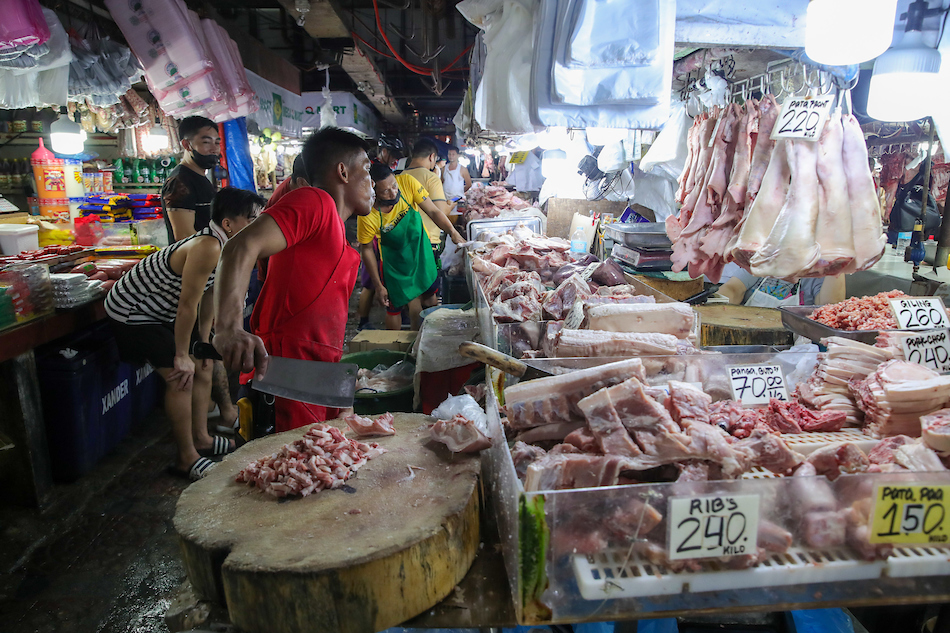NEDA backs EO extending lower tariffs on pork, rice, corn, coal | ABS-CBN
ADVERTISEMENT

Welcome, Kapamilya! We use cookies to improve your browsing experience. Continuing to use this site means you agree to our use of cookies. Tell me more!
NEDA backs EO extending lower tariffs on pork, rice, corn, coal
NEDA backs EO extending lower tariffs on pork, rice, corn, coal
Anjo Bagaoisan,
ABS-CBN News
Published Dec 17, 2022 09:32 PM PHT
MANILA — The board of the National Economic and Development Authority (NEDA) endorsed to President Ferdinand Marcos Jr. on Friday an executive order to extend lower tariffs currently imposed on imported commodities such as pork, corn, rice, and coal, Sec. Arsenio Balisacan said Saturday.
MANILA — The board of the National Economic and Development Authority (NEDA) endorsed to President Ferdinand Marcos Jr. on Friday an executive order to extend lower tariffs currently imposed on imported commodities such as pork, corn, rice, and coal, Sec. Arsenio Balisacan said Saturday.
The socio-economic planning head said this would give relief to Filipinos affected by high prices.
The socio-economic planning head said this would give relief to Filipinos affected by high prices.
According to the proposed order, the reduced tariffs on pork, corn, and rice, which had first been imposed in 2021, will last until December 31, 2023.
According to the proposed order, the reduced tariffs on pork, corn, and rice, which had first been imposed in 2021, will last until December 31, 2023.
The lower tariff on coal, meanwhile, will be extended into 2024 and be subject to review every semester, Balisacan said.
The lower tariff on coal, meanwhile, will be extended into 2024 and be subject to review every semester, Balisacan said.
ADVERTISEMENT
“Through this policy, we shall augment our domestic food supplies, diversify our sources of food staples, and temper inflationary pressures arising from supply constraints and rising international prices of production inputs due to external conflict,” Balisacan said at a media forum in Quezon City.
“Through this policy, we shall augment our domestic food supplies, diversify our sources of food staples, and temper inflationary pressures arising from supply constraints and rising international prices of production inputs due to external conflict,” Balisacan said at a media forum in Quezon City.
No word yet on when the proposed executive order could be put out.
No word yet on when the proposed executive order could be put out.
Balisacan said inflation, which was at 8.0% last November, is a constant challenge despite the Philippine economy remaining robust with strong domestic demand and an upbeat labor market.
Balisacan said inflation, which was at 8.0% last November, is a constant challenge despite the Philippine economy remaining robust with strong domestic demand and an upbeat labor market.
“The key to tempering these effects is to ensure food security in the short and long term through timely importation and addressing long-standing supply-side constraints in agriculture value chains,” he said.
“The key to tempering these effects is to ensure food security in the short and long term through timely importation and addressing long-standing supply-side constraints in agriculture value chains,” he said.
However, Balisacan said they are anticipating “favorable economic conditions” for the country in the near term.
However, Balisacan said they are anticipating “favorable economic conditions” for the country in the near term.
This, he said, would be contributed by the reopening of China’s economy, moderating global oil prices, easing of monetary policy tightening, and continued remittances from overseas Filipinos.
This, he said, would be contributed by the reopening of China’s economy, moderating global oil prices, easing of monetary policy tightening, and continued remittances from overseas Filipinos.
Tariffs on imported rice were temporarily reduced to 35-percent quota by former President Rodrigo Duterte in 2021 as a way of reducing inflation and keeping supplies diversified.
Tariffs on imported rice were temporarily reduced to 35-percent quota by former President Rodrigo Duterte in 2021 as a way of reducing inflation and keeping supplies diversified.
Imported pork tariffs were adjusted as a compromise to buoy local hog raisers through the threat of the African Swine Fever.
Imported pork tariffs were adjusted as a compromise to buoy local hog raisers through the threat of the African Swine Fever.
Last May, Duterte signed Executive Order 171 extending the import tariff rates until the end of 2022.
Last May, Duterte signed Executive Order 171 extending the import tariff rates until the end of 2022.
Meat importers in September urged President Marcos to cut pork import tariffs in the next 5 years.
Meat importers in September urged President Marcos to cut pork import tariffs in the next 5 years.
Read More:
economy
NEDA
Arsenio Balisacan
National Economic and Development Authority
tariff
import tariff
pork
rice
corn
coal
ADVERTISEMENT
ADVERTISEMENT


